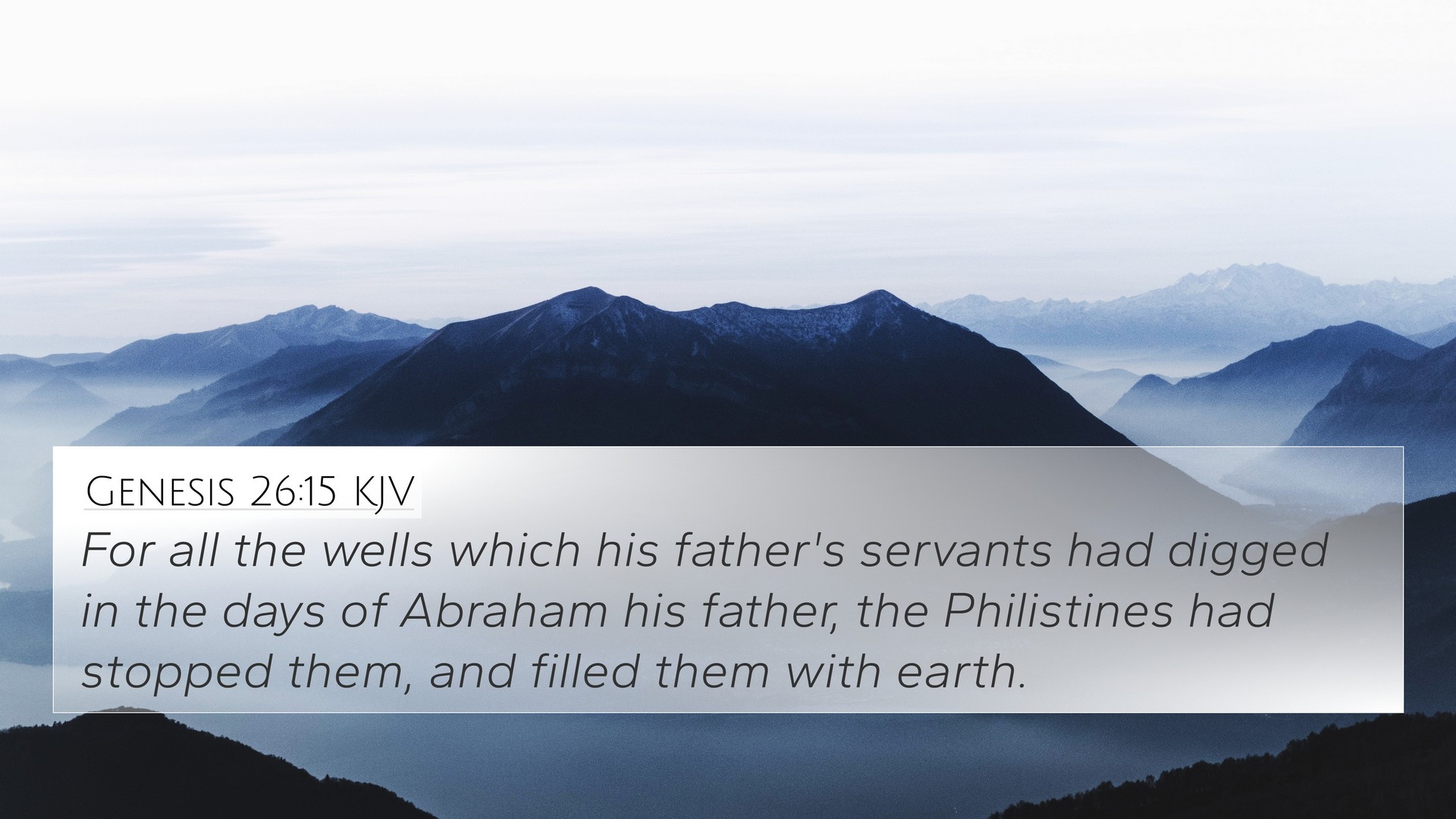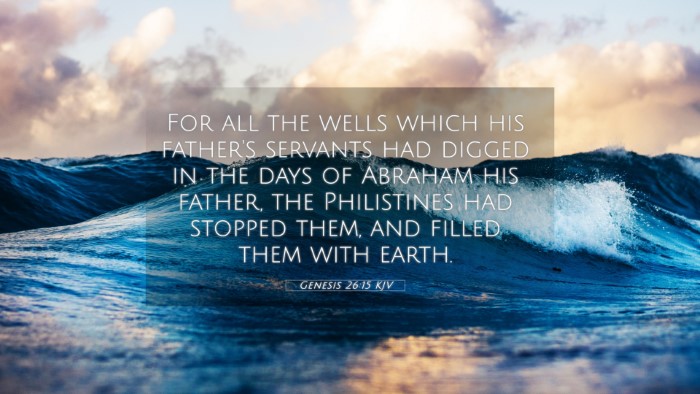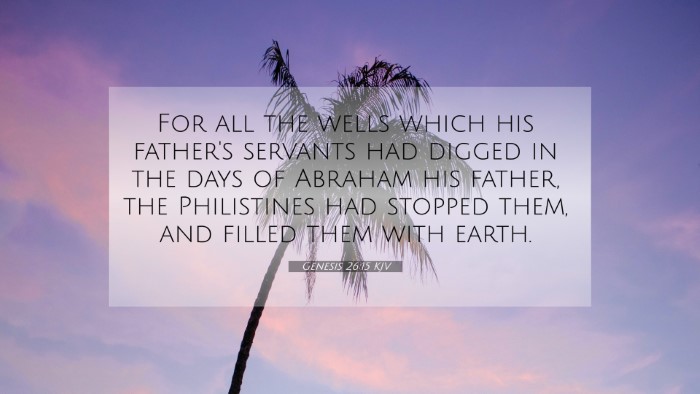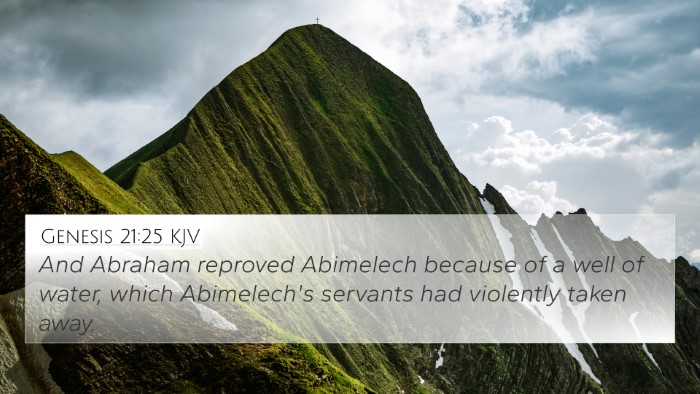Understanding Genesis 26:15
Genesis 26:15 states: "For all the wells which his father's servants had digged in the days of Abraham his father, the Philistines had stopped them, and filled them with earth."
Summary of Perspectives
This verse highlights the conflicts and challenges faced by Isaac, the son of Abraham. Following in his father's footsteps, Isaac finds that the Philistines have filled the wells that his father had dug, indicating a recurring theme of struggle for God’s blessings.
Thematic Analysis
Different public domain commentaries provide insights into this verse:
- Matthew Henry: Henry emphasizes the significance of wells in the life of nomadic tribes, viewing them as symbols of blessing and provision. He notes the hostility that Isaac faced as another layer of the trials that the patriarchs endured while pursuing God’s promises.
- Albert Barnes: Barnes focuses on the consequences of the Philistines' actions, explaining how their interference with Isaac’s resources represents a larger conflict over territorial rights and divine inheritance. He suggests that this illustrates the enmity that often arises between the faithful and those who oppose God's covenant.
- Adam Clarke: Clarke presents a view on the historical context, citing the deeper spiritual and social implications of these actions by the Philistines. He examines how this act of filling the wells symbolizes an attempt to undermine Isaac's legacy and contention for the blessings promised to Abraham's descendants.
Biblical Context
Genesis 26:15 occurs in a broader narrative discussing Isaac’s life, particularly in contrast to that of his father, Abraham. The filling of the wells represents a denial of access to resources that are essential for survival and prosperity.
Cross-References
To understand Genesis 26:15 fully, several biblical cross-references help illuminate its significance:
- Genesis 21:25 - This verse details a conflict between Abraham and Abimelech over a well, setting a precedent for hostility over water resources.
- Genesis 26:18 - Following the filling of the wells, Isaac re-digs the wells of his father, highlighting perseverance and reclaiming the blessings of God.
- Numbers 20:17 - The Israelites also faced similar challenges in the wilderness regarding water, illustrating the ongoing struggles for the sustenance that God provides.
- John 4:14 - Jesus speaks of the "water of life," which connects to themes of provision and spiritual sustenance that parallels the physical wells dug by Isaac.
- Isaiah 12:3 - References to drawing water with joy depict the deeper significance of water as a blessing from God.
- Genesis 12:1-3 - This foundational scripture of God’s promise to Abraham indicates the enduring nature of God’s covenant and blessings despite opposition.
- Romans 8:31 - This verse where Paul emphasizes that "if God is for us, who can be against us?" resonates with Isaac's situation, highlighting trust in God amidst adversity.
Lessons and Spiritual Implications
Genesis 26:15 serves as a profound lesson on resilience in faith. The act of the Philistines symbolizes worldly opposition faced by believers, while Isaac's determination to re-dig the wells correlates with the believer's call to reclaim what God has promised.
Practical Applications
- Identifying Resources: Just as wells were vital for Isaac, spiritual resources—prayer, community, scripture—are essential for believers today.
- Persistence in Faith: The example of Isaac shows the importance of faithfulness and determination in the face of adversity.
- Understanding Blessings: Recognizing that the blessings one seeks may sometimes be contested, and that faith must be exercised to experience God’s provision.
The Importance of Cross-Referencing
When studying Genesis 26:15, utilizing tools for Bible cross-referencing can greatly enhance understanding. By linking this verse with others, one gains insights into the parallels in scripture and the overarching themes of struggle, faith, and divine provision.
Conclusion
Genesis 26:15 is a pivotal verse that encapsulates the struggles of Isaac’s life as he strives to navigate through familial legacies and the challenges posed by those around him. It serves as a reflection of the spiritual journey of believers who seek to reclaim God’s promises while facing opposition. Through the wisdom garnered from public domain commentaries and biblical cross-references, one can attain a deeper understanding of this verse within the grand narrative of Scripture.




